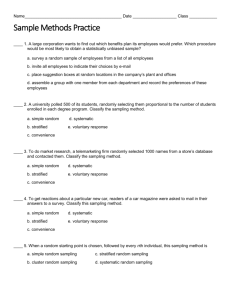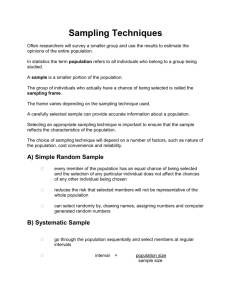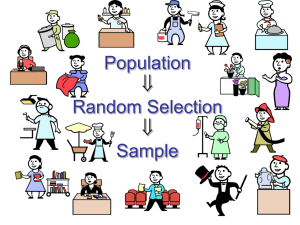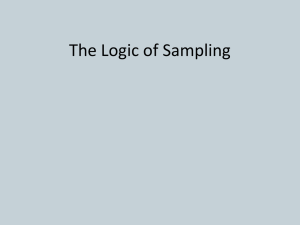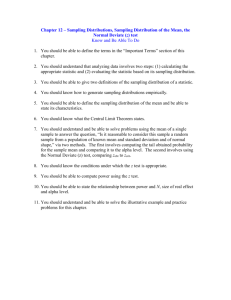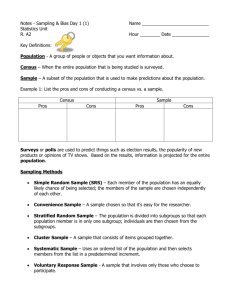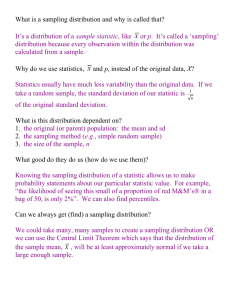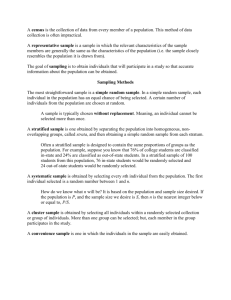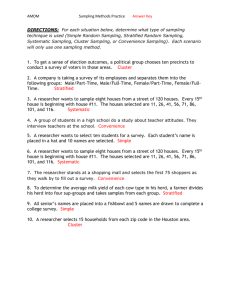Simple random sampling - Greer Middle College || Building the Future
advertisement
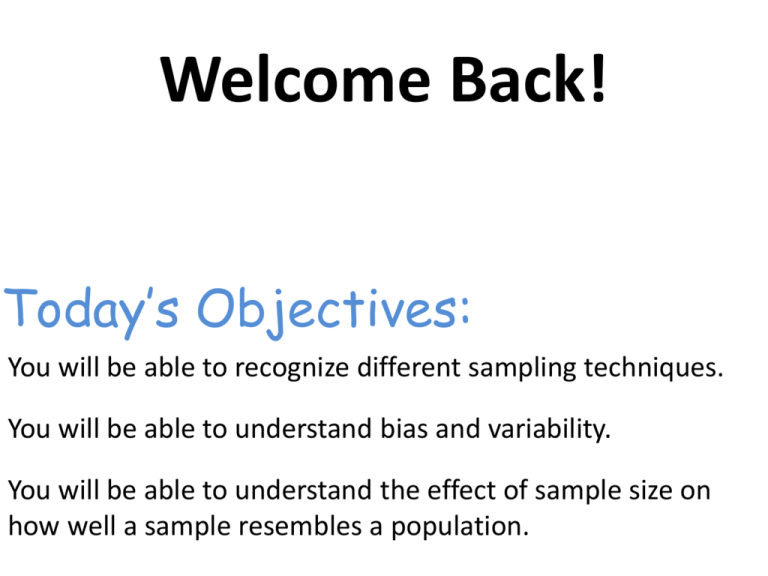
Welcome Back! Today’s Objectives: You will be able to recognize different sampling techniques. You will be able to understand bias and variability. You will be able to understand the effect of sample size on how well a sample resembles a population. Populations and Samples A population is a group about which information is desired. A sample is a part of a population chosen to get information about the whole population. Voluntary Response Sample A voluntary response sample consists of people who chose themselves by responding to a general appeal. Write-in or call-in opinion polls. Convenience Sample Selection of whichever individuals are easiest to reach is called convenience sampling. Sampling at the mall or the zoo Bias The design of a statistical study is biased if it systematically favors certain outcomes. Simple Random Sample Simple random sampling (SRS) is the basic sampling technique where each individual is chosen entirely by chance and each member of the population has an equal chance of being included in the sample. Drawing names from a hat. Stratified Random Sample A stratified random sample is a sample of the population that is split into groups. Take a separate SRS of each group and combine the results to make a full sample. Sampling seniors, juniors, sophomores, and freshmen and combining results. Examples Tell whether the samples are simple random, stratified, voluntary response or convenience. 1. The local news station asks viewers to go to their web page and answer the following survey poll, “Do you like the rainy weather that we are having?” 2. Corwin has a project due tomorrow. He was suppose to survey family and friends to find out what their favorite type of ice cream is. Corwin is running out of time, so he walks up to the local supermarket and does his survey with shoppers as they walk out of the store. Examples Tell whether the samples are simple random, stratified, voluntary response or convenience. 3. Jared has a baseball card collection with over 500 cards. His friend believes that Jared has baseball cards with New York Yankee players than any other team. Jared tries to prove him wrong. Jared has his friend randomly select 125 baseball cards. 4. William believes that given a choice, men would pick a dog as a pet over a cat and women would pick a cat as a pet over a dog. William surveys a hundred men and a hundred women and asks them if they would prefer a cat or a dog. Examples Tell whether the samples are simple random, stratified, voluntary response or convenience. 5. The eleventh grade class complains constantly about how much homework they have. They believe that they get more homework than any of the other grades. Just to satisfy the 11th graders, the principal surveys a percentage of each of the grade levels and asks how many hours a week they spend on homework. 6. Alicia’s school is having a field day at her school. The staff wants to know what sports they should play on field day. Alicia randomly asks students what sport they prefer as they are leaving school for the day. Parameter and Statistic A parameter is a number that describes the population. A parameter is a fixed number, but in practice we don’t know its value. A statistic is a number that describes a sample. The value of a statistic is known when we have taken a sample. Lottery The proportion of all adults who bought a lottery ticket in the past 12 months is a parameter describing the population of 235 million adults. Call it 𝑝, for “proportion.” We do not know the value of 𝑝. To estimate 𝑝, take a sample of 1523 adults. The proportion of the sample who bought lottery tickets is a statistic. Call it 𝑝. 868 adults bought tickets so, 𝑝 = 868 1523 = 0.57 Homework Sampling Techniques Worksheet Due Wednesday!
